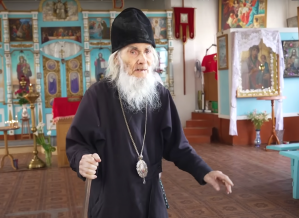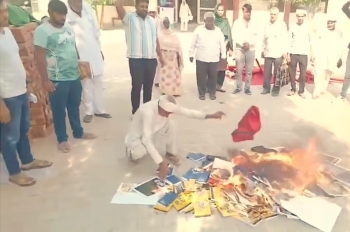
At 6 a.m. on Oct. 3, two clergymen staying at parish premises on Russia’s western edge awoke to find military figures armed with machine guns raiding the site, seizing electronic devices, documents and computer hard drives.
The Rev. Viktor Pivovarov, 86-year-old leader of the Holy Intercession and Tikhon Church in Slavyansk-on-Kuban, had criticized Russia’s invasion of Ukraine as “satanic.” His assistant, the Rev. Hieromonk Iona Sigida, was accused of writing an anti-war article opposing the ideology of conflict.
“They take me abruptly inside, throw me to the ground, trip me up, face down on the floor,” Sigida told media outlet Novaya Gazeta. “They burst into the temple with machine guns, in camouflage, in SOBR balaclavas, straight with machine guns, like military men. They twist me on the floor. And [one of them] puts his knee on my back and presses me, so that I suffocate.”
The Russian security forces interrogated Sigida and beat his body and face, breaking his arms by twisting them behind his back, he told Novaya Gazeta. They tried to shave his beard off but stopped when the priest, who has a spinal disorder, began convulsing. He said that after taking him to the police station, officers forced 18-year-old “witnesses” to state that he had resisted by rushing and grabbing officers.
Sigida then spent two days in jail on false accusations of disobeying a police officer, and authorities opened a case against his father for “discrediting” the army, he told Novaya Gazeta.
Archbishop Pivovarov, who had been fined earlier in the year for “discrediting” Russia’s armed forces, escaped beating during the raid, but the security operatives stripped off his clothes and threatened him, he told Forum 18.
It was the latest confrontation between authorities and Pivovarov, archbishop of the Slavic and South Russia’s Orthodox Church (RosOC), which is not subordinate to the Russian Orthodox Church. On Feb. 19, Pivovarov had spoken against the invasion of Ukraine during a sermon. Suddenly a woman – whom no one had seen before – stood up during the service and shouted, “You will be in big trouble” and left.
Slavic City Court on March 24 imposed a fine of 40,000 Rubles (450USD) on him for “discrediting” the Russian armed forces. He pleaded guilty.
“I told the investigators, the policemen and the court: If foreign tanks are there under our windows, it means we are at war with an enemy, an interventionist,” the archbishop told Novaya Gazeta-Europe. “But if our tanks are in a neighboring country, and our soldiers are savagely torturing the people, waging an invasive war, then they are damned. Such a war is cursed by both God and man. Our war is a great evil.”
Authorities are investigating the archbishop for alleged, repeated “discreditation” of the Russian Armed Forces (Criminal Code Article 280.3, Part 1), according to Forum 18. Conviction would result in a five-year jail term or a fine equivalent to a year’s average pension in Russia.
Forum 18 reported that the Federal Investigative Committee and Krasnodar Region branches of the Interior Ministry and Federal Security Service refused to respond its questions about the investigation.
The archbishop told Novaya Gazeta-Europe that he expected imprisonment or death at the hands of Russian authorities.
“I am waiting to be either killed or imprisoned,” Pivovarov said. “Then the world will know and will wonder: Who was he? Did he know in advance what was going to happen and the mysteries of existence? Where were we looking? And then there will certainly be a coup in Russia and uprisings.”
The Ukrainian conflict also has put pressure on Christians in occupied parts of Ukraine where Russian armed forces have arrested three priests, with prison authorities refusing to confirm their location, Forum 18 reported.
The Rev. Bohdan Heleta and the Rev. Ivan Levytsky, both Greek Catholic priests from Berdiansk, along with Ukrainian Orthodox priest Kostiantyn Maksimov of Tokmak, could be dead or alive. Prison authorities in Donetsk and Crimea will not confirm if they are incarcerated in Russian-controlled prisons, according to Forum 18.
Russian authorities arrested Heleta and Levytsky at the Church of the Nativity of the Most Holy Theotokos in November 2022. Separately, occupation forces seized Maksimov as he tried to get into Crimea in May.
The U.N. Office of the High Commissioner for Human Rights (OHCHR) expressed concern about Maksimov’s situation in a “Report on the Human Rights Situation in Ukraine, 1 February-1 July 2023.”
“In occupied territory, OHCHR documented that Russian armed forces disappeared two clergymen belonging to the UOC [Ukrainian Orthodox Church],” the report states. “They detained one victim, a pro-Ukrainian priest, from August 2022 to May 2023 in three different facilities in Kherson region. In one of them, he was tortured and ill-treated.”
Russian armed forces detained Maksimov when he attempted to cross the administrative boundary line in Crimea in May, according to the U.N. report.
“As of 31 July 2023, his fate and whereabouts remained unknown despite multiple requests from his relatives to the occupying authorities and official institutions of the Russian Federation, raising serious concerns with respect to enforced disappearance,” the report states.
In occupied Donetsk, Russian officials sent two Orthodox Church of Ukraine priests to a deportation center in Rostov-on-Don, Russia following their arrest for “missionary activities” in September. Both priests, the Rev. Khristofor Khrimli and the Rev. Andri Chui, refused to comply with orders to accept Russian citizenship in order to return to Donetsk. A court fined them.
Both priests prefer to live in Donetsk and refused deportation via Latvia, Forum 18 reported, citing bailiff Aleksandr Nikolenko.
“If they took Russian citizenship, they could return to Donetsk, but they can’t do so as citizens of another state,” Nikolenko told Forum 18.
The suffering of priests in the conflict zone is part of a wider persecution of Christians and people of other faiths. In July, the U.N. Security Council recorded more than 116 religious sites damaged in Ukraine.
“Religious sites should be places of worship, not places of war,” Nihal Saad, director of the U.N. Alliance of Civilization, reportedly told the U.N. Security Council in July.
Christian Vision, a Belarusian Christian Ecumenical Group and other parties publishes an ongoing updated list of persecuted believers in the war zone.





